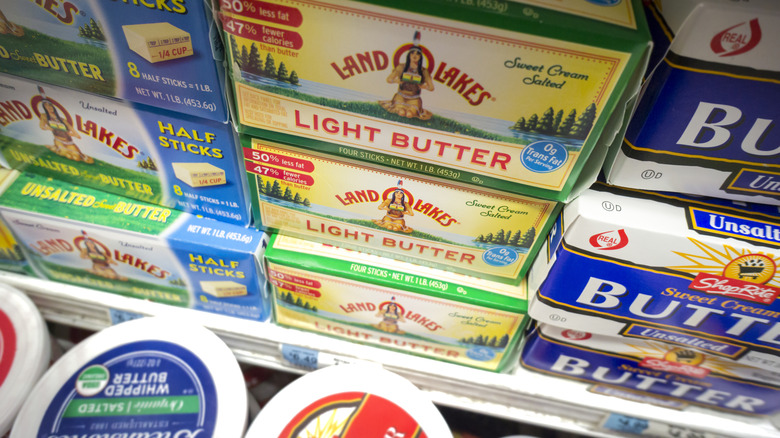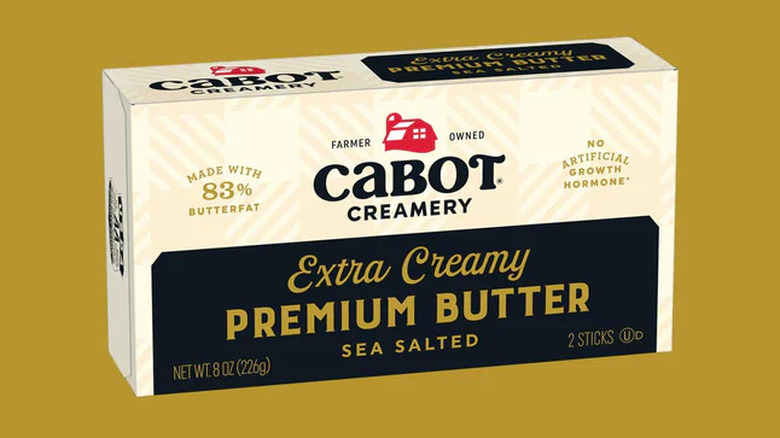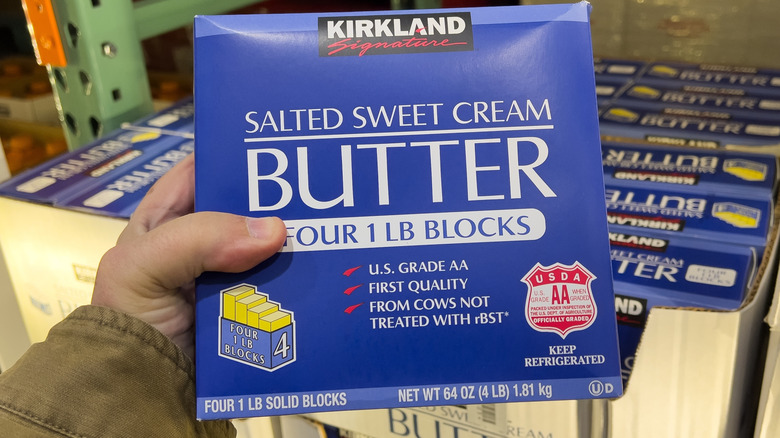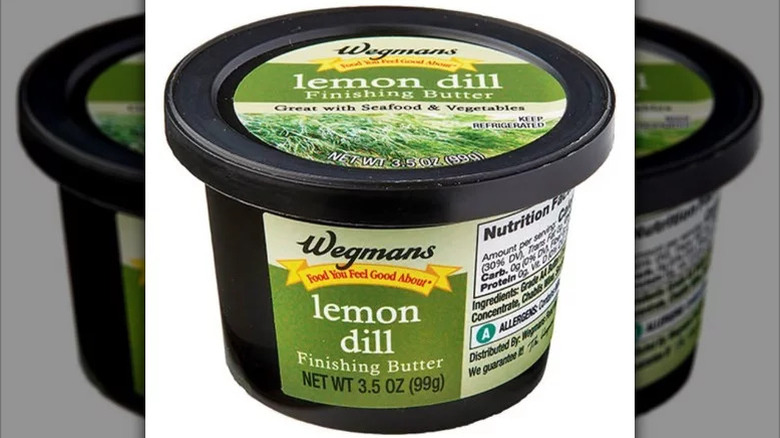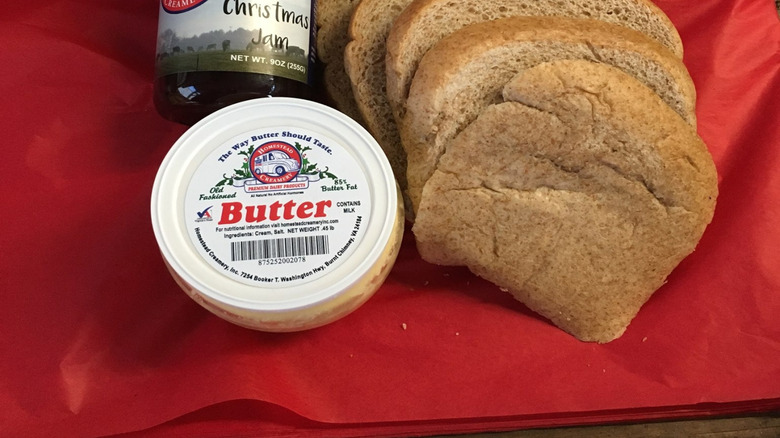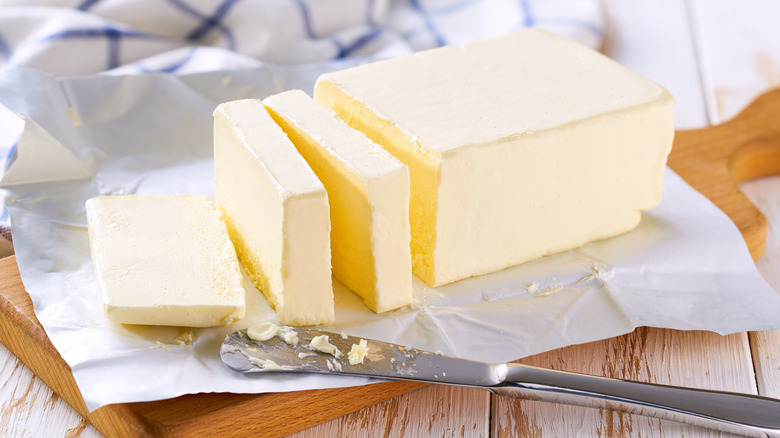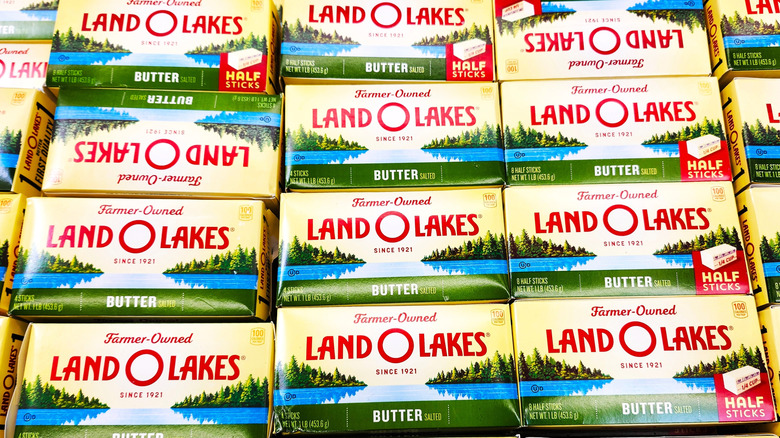The Biggest Butter Recalls Of All Time
No matter what kind of butter you buy, there's really not much to it. First, cream gets separated from milk, and then it's churned until it's a soft solid. From there, it's ready to make magic as either a toast or popcorn topping, cooking fat, a vital ingredient in baked goods, to list just some of its uses. Whether it's used at home or in a restaurant, where it tastes so much better than store-bought for some reason, butter is a universal culinary must-have.
So if and when a bad batch of butter goes out into the world, the effects can be catastrophic. While butter is almost always safe to eat — its low-moisture, high-fat makeup and the pasteurization process makes for an environment inhospitable to food-borne illness — once in a while a large-scale manufacturing concern or large dairy operation releases tainted or compromised product. At that point, they'll stage a recall to limit the potential damage to the public's health. Here's a look back at all of history's most significant butter recalls.
Cabot Creamery (2025)
A cooperative of northeastern dairies conducting business as Agri-Mark makes and distributes butter under the Cabot Creamery brand name. Cabot Creamery is the brand of butter Ina Garten always keeps in her kitchen for cooking. Its Extra Creamy Premium Butter, Sea Salted, is sold in cardboard boxes containing two four-ounce sticks throughout New York, Pennsylvania, Vermont, Connecticut, New Hampshire, Maine, and Arkansas.
In April 2025, 1,701 pounds (or 189 cases) were ordered back to Agri-Mark. The dairy discovered an unacceptably high level of coliform in some of the butter. Coliform is a bacteria variety commonly found in human fecal matter, and if that germ is discovered in food, it means the product has likely somehow made contact with solid waste. Ingesting the bacteria itself doesn't cause common symptoms of food poisoning, but they're often spotted alongside other pathogens that do cause illness.
Between the time it uncovered the coliform issue and when it announced the recall, Agri-Mark successfully re-obtained 99.5% of the potentially bacteria-infested butter from distributors. Of the 1,701 pounds of Cabot Creamery product recalled, just 8.5 pounds, or 17 boxes, remained at large, and all had been sent out for sale in Vermont. Fortunately, no sicknesses related to consumption of the butter were reported to the manufacturer.
Kirkland Signature (2024)
As of this publication, there are more than 600 Costco stores in the United States alone, and those massive, warehouse-style markets sell products in bulk as a matter of course. When the chain has to stop selling a product and ask for customers to return it, particularly if it's something under its Kirkland Signature private label, that's a Costco recall that can potentially affect millions. In November 2024, right in the midst of the busy holiday baking season when butter is in high demand, Costco was forced to recall 80,000 pounds of its Kirkland Signature Sweet Cream butter, in both salted and unsalted varieties. The reason: a labeling issue, in that the packages neglected to list a common dietary allergen, as is required by food manufacturers in the U.S.
Produced for Costco by Continental Dairy Facilities Southwest, six lots were included in the recall, because the boxes didn't warn customers that the butter inside contained milk. Milk is one of the known allergens that must be disclosed on food labels, according to the FDA. Costco therefore recalled the butter because they needed to be in compliance with this regulation.
Wegmans Lemon Dill Finishing Butter (2022)
It's cheaper to buy generic products at the grocery store, also known as private label brands. Industrial manufacturers and major companies often make those products, and for the large and upscale East Coast chain Wegmans, the specialty butter comes from Epicurean Butter. The Colorado-based company produces Wegmans Lemon Dill Finishing Butter, using frozen dill provided by an herb company. In August 2022, that supplier alerted the dairy that another of its clients tested some of its dill for the bacteria that causes listeria poisoning, and that it had received a positive result. Characterized by nausea and diarrhea in most who contract that type of food-borne illness, the infection is possibly deadly to the immune-compromised, children, and older individuals.
Epicurean ordered a recall of 12 lots of just the one product, Wegmans Lemon Dill Finishing Butter, with expiration dates ranging from July to November 2022. More than 1,100 cases of the 3.5-ounce plastic tubs of butter had potentially been tainted. The recall was ultimately successful, as no listeria poisoning cases were ever linked to the Epicurean-made Wegmans-branded condiment butter.
Homestead Creamery (2020)
Virginia-based Homestead Creamery is a large regional bakery that produces a full range of dairy products like milk, ice cream, cheese, and butter. It sells its wares through supermarkets, its own retail outlet, and via home delivery, and in April 2020 it put out the word through all channels to temporarily end distribution on a certain lot of butter. Half-pound boxes of unsalted butter were recalled by Homestead after some regular testing on a sample suggested the presence of Listeria monocytogenes, the pathogen that causes listeria infection.
Consumption of food tainted with listeria can lead to fever, nausea, and gastrointestinal symptoms as well as more serious illness or death in the youngest and oldest segments of the population. Immediately after the listeria was detected, Homestead Creamery temporarily stopped making the salted butter and allowed the Virginia Department of Agriculture and Consumer Services to look into how the bacteria appeared in the butter in the first place.
No illnesses were reported to Homestead, or the Food and Drug Administration, which amplified the recall notice, before or after the company asked for customers to return the butter to where they bought it. The recall ended 16 days after it was first issued.
Zander's Creamery (2004)
Since the late 19th century, Zander's Creamery operated out of a large facility in Cross Plains, Wisconsin. It grew into a large dairy products factory and found a market niche as an industrial supplier. By the 2000s, Zander's Creamery made and shipped butter in large quantities for use in the production of foods processed by other companies and it also supplied pre-made shaped butter and butter chips to restaurants across the United States. In April 2004, a regularly scheduled test of a product sample uncovered listeria monocytogenes, a bacteria that leads to food-borne illness. Listeria infection can trigger fever, aches, and diarrhea for most healthy adults; it can kill older people, young children, and the immune compromised.
Zander's Creamery ordered a major recall of much of its Zander's and GFS-branded butter and butterine, a mash-up of butter and margarine. The recall was pre-emptive, as no infections had yet been reported. Unfortunately, that led to the end of the company. Within a year after the initial recall, and finding it difficult to locate or eliminate the listeria's origin, Zander's Creamery ceased operations.
Land O Lakes (2003)
Small pieces of metal aren't a sickness-inducing pathogen that takes root in and thrives in food, but that's still a dangerous and unintended ingredient that manufacturers don't want anywhere near their product. Inedible and rough, unknowingly consumed metal can lead to serious dental or internal injury, and if it shows up in a food, a recall will likely result in a timely manner.
Minnesota-based Land O Lakes, a major butter maker, put out a recall notice in July 2003 for one of its flagship items, multi-count boxes of sticks of salted butter. Neither the company nor the FDA, assisting in the recall, had fielded any notices of injury from customers who'd eaten the affected butter, which bore one of three lot codes. Land O Lakes aimed to get back those three runs of butter, sent to stores throughout many states in the western U.S., because during production, small pieces of metal had found their way into the product.
